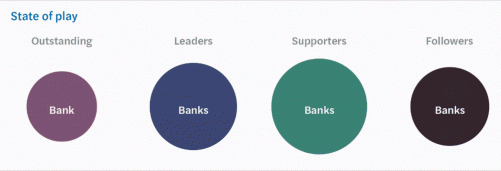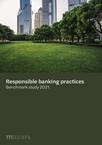The Covid-19 pandemic underlined the importance of financial system resilience. Banks around the world recognise they have a key role to play in the transition to a sustainable future aligned with the objectives of the United Nations’ Sustainable Development Goals and the Paris Agreement.
Our third benchmark study of responsible banking practices takes a closer look at evolving best practices and developing trends in managing climate change risk and broader social and governance issues. Building on Mazars’ previous report: “Responsible banking practices, Benchmark study 2020”, our latest study identifies how banks are taking collective responsibility to create the new foundations of a sustainable financial industry and contribute to building healthier economies.
We segmented 37 banks – the largest, by total assets, in their respective geographies – into four categories: outstanding, leaders, supporters, and followers. It is encouraging to see more banks rank as leaders compared to the last benchmark’s findings, achieving a positive score between 80% and 95%, despite the tightening of our assessment criteria to reflect the improvement of the practice and requirements.
However, many challenges remain. There is still room for improvement, especially in regions where industry guidelines and ESG-related regulations are lacking. In effect, strong sustainability practices often come hand-in-hand with consistent industry and legal incentives.
















